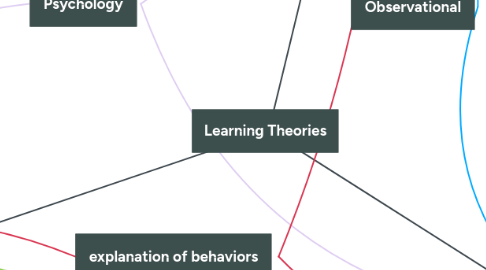
1. Development
2. Constructivism
2.1. Piaget
2.1.1. Genetic Epistemology
2.1.1.1. happens in stages
2.1.1.1.1. touch
2.1.1.1.2. early reasoning
2.1.1.1.3. early logic
2.1.1.1.4. abstract thought
2.2. Vygotsky
2.2.1. Zone of Proximal Development
2.2.1.1. Learn from other by:
2.2.1.1.1. context
2.2.1.1.2. language
2.2.1.1.3. assessing prior knowlege
2.2.1.1.4. personal experience
2.3. Bruner
2.3.1. representing knowledge
2.3.1.1. actions
2.3.1.2. icons
2.3.1.2.1. discovery learning
2.3.1.3. languages
2.3.2. discovery of learning
2.3.3. problem solving
2.4. Gardner
2.4.1. Multiple Intelligences
2.4.1.1. visual
2.4.1.2. linguistic
2.4.1.3. logical/mathimatical
2.4.1.4. kinesthetic
2.4.1.5. musical
2.4.1.6. interpersonal
2.4.1.7. intrapersonal
2.4.1.8. naturalistic
2.4.2. schema
2.4.2.1. generalized description
2.4.2.2. how knowledge is represented and used
3. social
4. Psychology
5. explanation of behaviors
6. Problem solving
7. tangibility
8. Cognitivism
8.1. 4 universal thinking skills
8.1.1. Distinctions
8.1.2. Systems
8.1.3. Relationships
8.1.3.1. Bandura
8.1.3.1.1. Social Learning Theory
8.1.3.1.2. bobo experiment
8.1.3.2. Ausubel
8.1.3.2.1. Meaningful Learning
8.1.3.2.2. rote learning
8.1.4. Perspectives
9. Behaviorist
9.1. Stimulus Response
9.2. Observations of behaviors
9.2.1. Watson
9.2.1.1. classical
9.2.1.1.1. only concerned with observable behaviors
9.2.2. Skinner
9.2.2.1. operant conditioning
9.2.2.1.1. "behavior theory"
9.2.2.1.2. Learning is a funciton
9.2.3. Pavlov
9.2.3.1. classical
9.2.3.1.1. pairing stimulus to get repsponce
